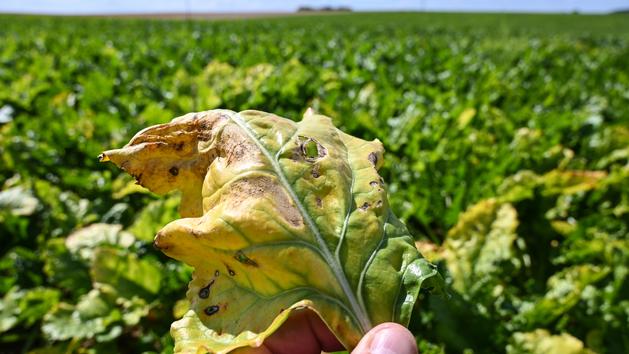Three years: industrialists and growers consider very short the time allowed by the government to find substitutes for neonicotinoid insecticides in beet crops, and roll up their sleeves to try to guarantee the future of the French sugar industry.
Read also: Beetroot: are jobs more threatened by international competition than by aphids?
"
We are making an exception that will last a very short time, three years maximum, and after that it will be over
", recently warned the Minister of Ecological Transition Barbara Pompili, while the text temporarily re-authorizing until 2023 these harmful products for insects, voted on in the Assembly, has yet to be considered in the Senate at first reading.
Franck Sander, president of the sugar beet union (CGB) hopes that the financial effort devoted to research will prevent a repeat of the 2020 harvest, which promises to be “
catastrophic
”.
Deprived since 2018 of neonicotinoids in the coating of their seed, a large part of French beets have indeed been undermined this year by jaundice transmitted by aphids.
In his fields near Saint Quentin (Aisne), Philippe Parmentier notes the damage: “
on average over five years, I am at 97 tonnes (...) This year, I am at 60 tonnes, I have neighbors who make 30
”, the dryness having added to the jaundice.
The impact is "
very heterogeneous
", adds Alexis Duval, chairman of the management board of the sugar group Tereos: "
the south of Paris and part of the Grand-Est region
" are affected by drops in yields that can go "
up to - 50%, -60%
”of beets per hectare, while the yields are“
good
”in the North and in Normandy.
Variety research, biocontrol ... A vast research program mobilizing "
20 million euros over three years
" will try to find solutions to do without neonicotinoids, recently underlined Philippe Mauguin, head of the Inrae Agronomic Research Institute. .
Read also: Beet yellows: without pesticides, will the French sugar industry disappear?
But Alain Commissioner, managing director of Cristal Union, the second largest French sugar group, says he is "
really concerned
" for the future, believing that the State, when the first ban on neonicotinoids was voted in 2016, turned a blind eye to the 'lack of alternative solutions for growers.
"
We are expecting a lot
" from the monitoring committee requested by the Minister of Agriculture after the temporary re-authorization of coated seeds, he adds.
This year, thanks to a rise in sugar prices, efforts to reduce costs and a better valuation of beet, the two French groups are counting on a positive net result.
Nevertheless, the poor harvest will reduce the use and therefore the profitability of the industrial tool: Tereos thus expects on average 110 to 115 campaign days against 120 to 130 days in recent years, while Cristal Union forecasts an "
average campaign around 100 days, against 118 days last year
”.
"Cries of despair" from some farmers
To encourage planters to replant next year, and supply the 24 French factories, manufacturers have raised the purchase price of beets this year.
Tereos has announced a minimum price of 24.50 euros per tonne, to which will be added bonuses and indemnities, against 22.37 euros in total last year.
Cristal Union will pay a base price of 24 euros, to which will be added a cyclical premium of one euro.
For the moment, there is no disaffection of farmers, either at Tereos or at Cristal Union.
A relief resulting from the visibility brought by the return of neonicotinoids, which guarantee their yields, but not only.
“
Indispensable
”
rotational head in the crop
rotation advocated by the environmental transition, beet makes it possible, unlike a land where there would be only cereals, to “
break the weed cycle
” ... And thus to limit agricultural inputs, argues Franck Sander.
To read also: Return of the neonicotinoids: Denormandie proposes to the opponents to put “the feet in the real one”
But even with the best will, some sugar beet regions, less productive, are on borrowed time, fears Alain Commissioner.
"The
more complicated the situation becomes in terms of climatology or disease resistance, the more the land has to be of good quality, it is clear that 'small land' planters will have more difficulties,
" he said.
He mentions in particular "
cries of despair
" in production basins south of Paris, affected for the second year by drought, in Loiret, Eure-et-Loir and Seine-et-Marne.
Two of the group's sugar factories depend on it.












/cloudfront-eu-central-1.images.arcpublishing.com/prisa/H7U7FJNUZBG6BPL5PZCMGC6EUY.jpg)